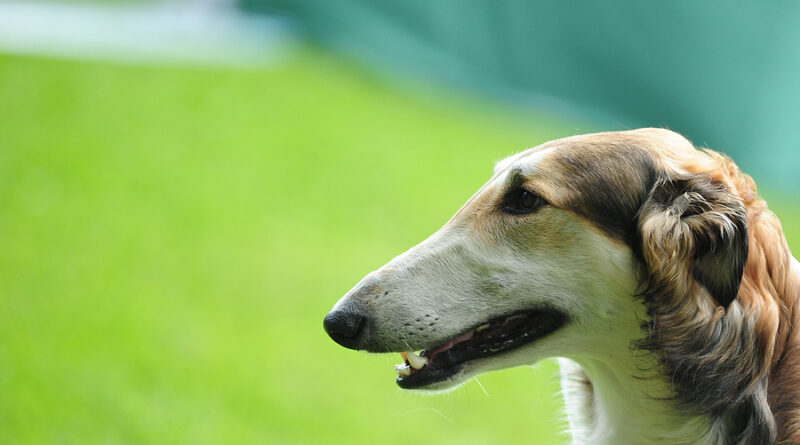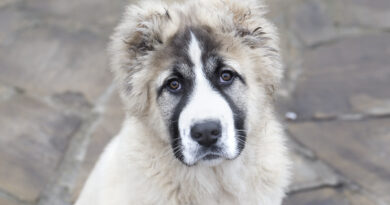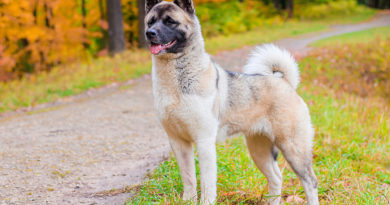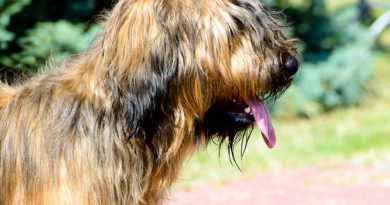Borzoi – all you need to know about this Russian hunting dog
Featured image by © bigstockphoto.com / evdoha
What is a Borzoi?
The Borzoi is a large, aristocratic, loyal and calm breed of sighthound. It is thought that they were probably first brought to Russia from Arabia in the 1600s. The Russian nobility took a liking to the breed, and crossed them with brave wolf-hunting sheepdogs, and as such, the breed earned its nickname of Russian Wolfhound. Eventually, the dogs spread through Europe where they gained popularity, especially among the British aristocracy, and Queen Victoria as well. The Borzoi eventually became more docile and companion-like over the years, though he still retains his talent for hunting, sighting and lure-coursing. The name “Borzoi” comes from the Russian word for swift.
Pros and Cons
- Calm, dignified and generally polite with people
- Does not bark much, and generally undemanding at home
- Loyal and affectionate with her family pack
- Good with other dogs. Ok with other household pets provided early socialization
- Good with well-mannered and gentle children. No rough-housing.
- Long-haired dog that sheds quite heavily, not hypoallergenic, and requires daily brushing
- Posseses Sighthound instincts. Loves to chase small animals, and can run off.
- Can be a bit stubborn and pose a training challenge
- Very large size may pose accidental hazard to small children
- High prey instinct. May hurt small creatures they are unfamiliar with.
Appearance and Size
Group: Hounds
Height: 26 – 28 inches
Weight: 60 – 105 pounds
The Borzoi is a tall, aristocratic dog with a long, thin, narrow head, a slightly arched muzzle. A mature male stands around 28 inches tall at the shoulder and weighs round 75 to 105 pounds. Females are usually smaller. The Borzoi has a luxurious long, silky coat which may be wavy or have large curls. Other characteristic features include a heavy-necked ruff, oblong, dark eyes, and ears which lie back on the neck but may prick up partially when the dog is alert. Coat colors include white, golden, tan or gray with black markings, in either solid or mixed colors. The Borzoi was originally bred for the coursing of wild game, and as such, boasts a Greyhound body type.
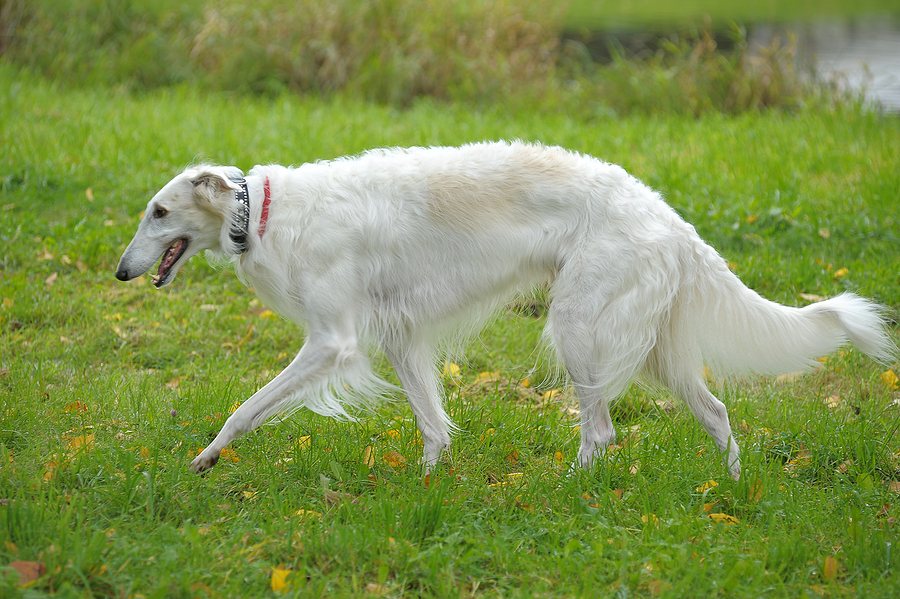
Temperament
The Borzoi is an intelligent and sweet-natured dog. She is extremely loyal to her family, and very affectionate with her pack. Borzoi are also independent and can sometimes be stubborn, so training may pose a challenge. Patience, consistency and early socialization are key. Like a cat, they keep themselves quite clean, and rarely bark. Like other sighthounds, they are quite fast and cannot be trusted off-leash, unless in a securely fenced or very safe area. If they get sight of a small animal, they may take off after it and ignore your calls. Borzoi are good around other dogs, however should be supervised with small non-canine pets such as cats and rabbits. They do ok with cats if socialized early enough. The Borzoi gets along fairly well with older children, though not ideally suited for younger children as they tend toward rough-housing. Overall they are usually gentle and well-mannered companions.
Grooming
The Borzoi long silky coat requires quick brushing every other day to keep it looking at its best. Like all long-haired breeds, it sheds a bit all year. Once a year, it will shed heavily, and will require daily brushing to remove dead hair. The Borzoi can tolerate frequent baths, though only bathe as deemed necessary. As with all dogs, trim nails often, and since this is a long-haired breed, ensure the hair between the toes is clipped to keep the feet comfortable.
Health
The Russian Wolfhound is generally a healthy breed, though like all breeds has its share of health concerns. The breed is deep-chested and prone to bloat. Other issues include osteochondritis dissecans, and progressive retinal atrophy. Since the Borzoi is a Sighthound, they can be sensitive to Anesthesia. It is best to feed the Borzoi only small meals two to three times a day as they can be picky eaters. Strenuous exercise is also not recommended before or after feeding time. Always feed quality dog food to ensure a healthy happy dog.
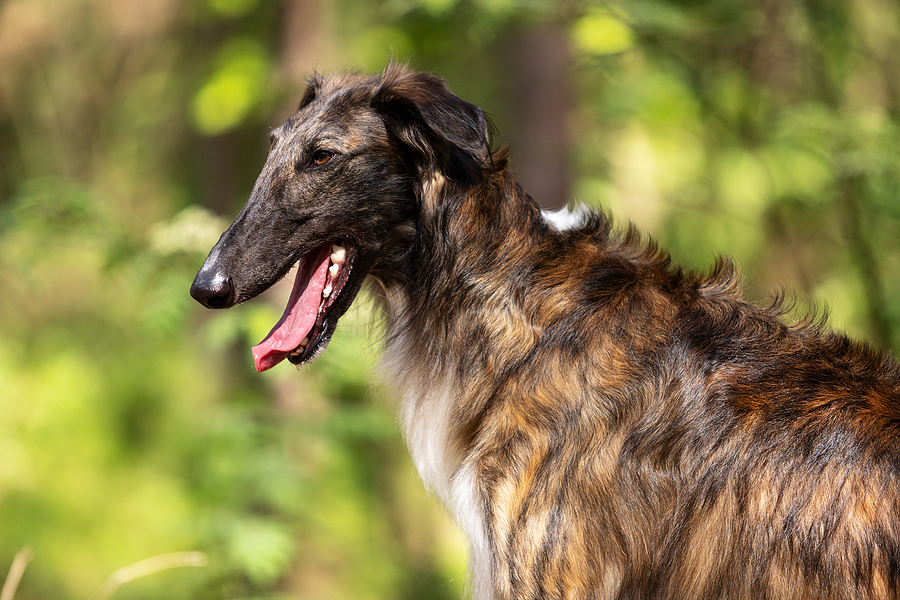
Life Expectancy
The Borzoi has a lifespan of around 10-12 Years
5 Fun Facts about Borzois
- Leo Tolstoy, the famous Russian novelist was a Borzoi enthusiast, and even wrote about them in his classic "War and Peace"
- The first Borzoi breed standard was written Russia in 1650
- In the United States, the breed was known as the Russian Wolfhound until 1936, when it was officially changed to Borzoi to match other international kennels.
- Borzois were used by the Russian nobility for their favorite sport - hunting. They would assemble large hunting parties, and a large pack of 100 dogs to track down and hunt Wolves.
- The Borzoi enjoyed a brief stint as a status symbol in early 1900s USA. They made a few appearances in the silent movies at the time.
Environment
The Borzoi is a smart and adaptable dog. They are relatively inactive indoors, so apartment living could work out if the dog is sufficiently exercised with long, daily walks. Keep in mind that they are large, athletic dogs, and ideally would fare best in a house with a large fenced in yard. Always keep your Borzoi on a leach when walking in public, as they may take off after a small creature. Borzois enjoy human company and love doing activities with their owners. Spend some quality time together and try out some agility training or lure coursing.

